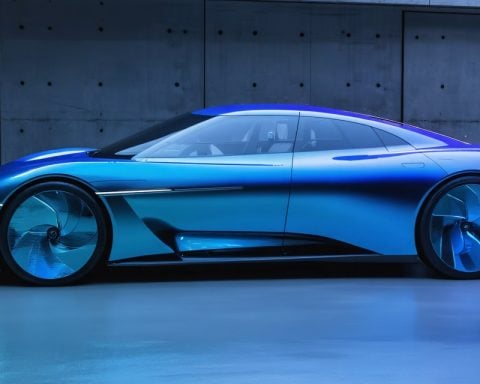- Altilium’s EcoCathode technology revolutionizes EV battery recycling with high recovery rates: over 97% of lithium and 99% of graphite from LFP batteries.
- The company is expanding its recycling focus to include NMC batteries, crucial for a sustainable battery supply chain in the UK.
- Altilium’s Plymouth plant processes an entire EV battery daily, with plans to scale and reclaim components from over 150,000 EVs annually in Teesside.
- This innovation significantly reduces the environmental impact of transitioning to electric vehicles by recirculating essential materials.
- Altilium is spearheading a shift towards an eco-friendly automotive industry, providing solutions to resource scarcity challenges.
In the ever-evolving world of electric vehicles, one UK innovator is steering us toward a sustainable horizon. Altilium’s cutting-edge EcoCathode technology promises to transform the landscape of EV battery recycling, breathing new life into old batteries and turning them into valuable resources. This groundbreaking approach achieves remarkable recovery rates—over 97% lithium and 99% graphite—from end-of-life Lithium Iron Phosphate (LFP) batteries, setting new standards in resource efficiency.
With an eye on the future, Altilium isn’t stopping at LFPs. Their comprehensive recycling initiative also targets Nickel Manganese Cobalt (NMC) batteries, critical to building a robust and sustainable battery supply chain in the UK. As the demand for electric vehicles skyrockets, Altilium’s innovations ensure that essential materials return to the production line, lowering the environmental impact of our transition to greener mobility.
Based in Plymouth, Altilium’s state-of-the-art recycling plant processes the equivalent of one entire EV battery daily, with ambitious plans to scale operations in Teesside. This expansion will enable them to reclaim components from over 150,000 EVs annually, positioning Altilium as a formidable force in the circular battery economy.
The takeaway? Altilium is not just altering the trajectory of EV battery recycling—it is creating a pivotal shift toward an eco-friendly automotive industry, where the daunting challenges of resource scarcity are met with intelligent and sustainable solutions. As we look to the future, technologies like EcoCathode highlight a transformative path to harnessing clean energy, preserving the planet, and powering our journeys with renewed responsibility.
Revolutionizing the EV Battery Recycling Industry: Learn About Altilium’s EcoCathode and the Future!
Key Innovations in EV Battery Recycling
Altilium is making waves in the electric vehicle (EV) industry with its pioneering EcoCathode technology, which offers new possibilities in the realm of EV battery recycling. Here are some significant insights and developments:
1. How Does EcoCathode Technology Compare to Traditional Methods?
EcoCathode technology represents a major leap forward compared to traditional recycling methods. Conventional techniques often struggle with inefficiency and lower recovery rates of metals. In contrast, EcoCathode achieves recovery rates of over 97% for lithium and 99% for graphite. This not only maximizes resource efficiency but also significantly diminishes the waste produced during recycling.
2. What Are the Forecasts for EV Battery Recycling Markets?
The global market for EV battery recycling is set for explosive growth, with forecasts predicting a compound annual growth rate (CAGR) of over 30% by 2030. As governments push for greener policies, the demand for sustainable recycling solutions like Altilium’s EcoCathode is expected to surge, particularly in Europe and North America. Altilium’s plans to expand its operations align strategically with this forecasted market expansion.
3. What Are the Advantages and Limitations of Altilium’s Approach?
Advantages:
– Exceptional material recovery rates enhance sustainability.
– Supports a circular economy by reintegrating scarce resources.
– Decreases dependence on new raw material extraction, which reduces environmental impact.
Limitations:
– Scalability is limited by current infrastructure; rapid expansion is needed to meet growing demand.
– Initial cost of technology implementation may be higher compared to more established, less efficient methods.
Altilium’s Expansion and Future Prospects
Altilium’s existing plant in Plymouth sets a new benchmark for efficient battery recycling, processing the equivalent of one entire EV battery daily. However, with plans to upscale in Teesside, they aim to process components from over 150,000 EVs annually. This ambitious expansion could position Altilium as a leader not only in the UK but in the global circular battery economy.
Sustainability and Innovation at Altilium
By targeting Nickel Manganese Cobalt (NMC) batteries alongside LFP ones, Altilium addresses broader segments of the battery industry, aligning with global movements towards sustainable energy solutions. As EV adoption continues to increase, technologies like EcoCathode will be integral in managing the environmental impacts of this transition.
For more information, visit Altilium to explore their initiatives and sustainability efforts.
In conclusion, Altilium’s EcoCathode technology is not just a breakthrough for UK recycling efforts but a crucial step toward a global shift to a more sustainable and resource-efficient future.
















